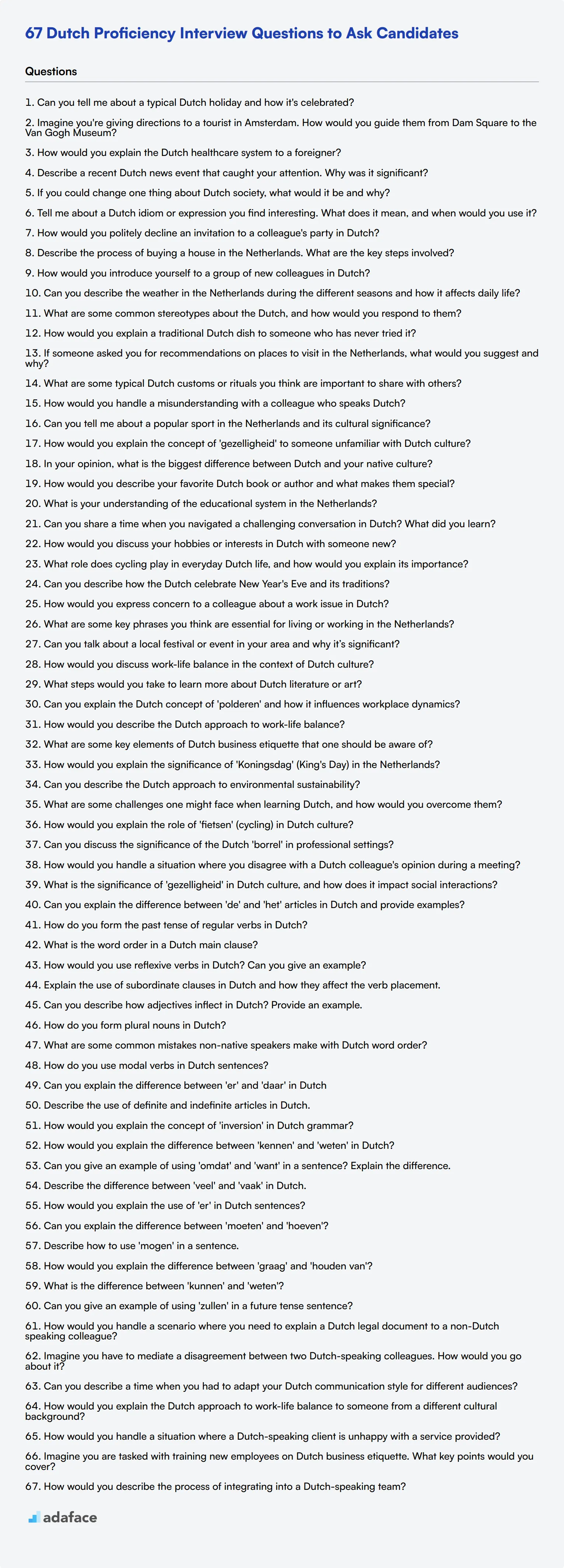Assessing Dutch proficiency in potential hires is crucial for companies operating in Dutch-speaking environments or serving Dutch-speaking clients. Effective interview questions can help recruiters and hiring managers gauge candidates' language skills accurately and make informed decisions.
This blog post provides a comprehensive list of Dutch proficiency interview questions tailored for various skill levels and aspects of language use. From general queries to specific grammar and vocabulary questions, we cover a range of topics to help you thoroughly evaluate candidates' Dutch language abilities.
By using these questions, you can identify top Dutch-speaking talent and ensure seamless communication within your organization. Consider combining these interview questions with a pre-employment Dutch language assessment for a more thorough evaluation of candidates' proficiency.
Table of contents
8 general Dutch Proficiency interview questions and answers
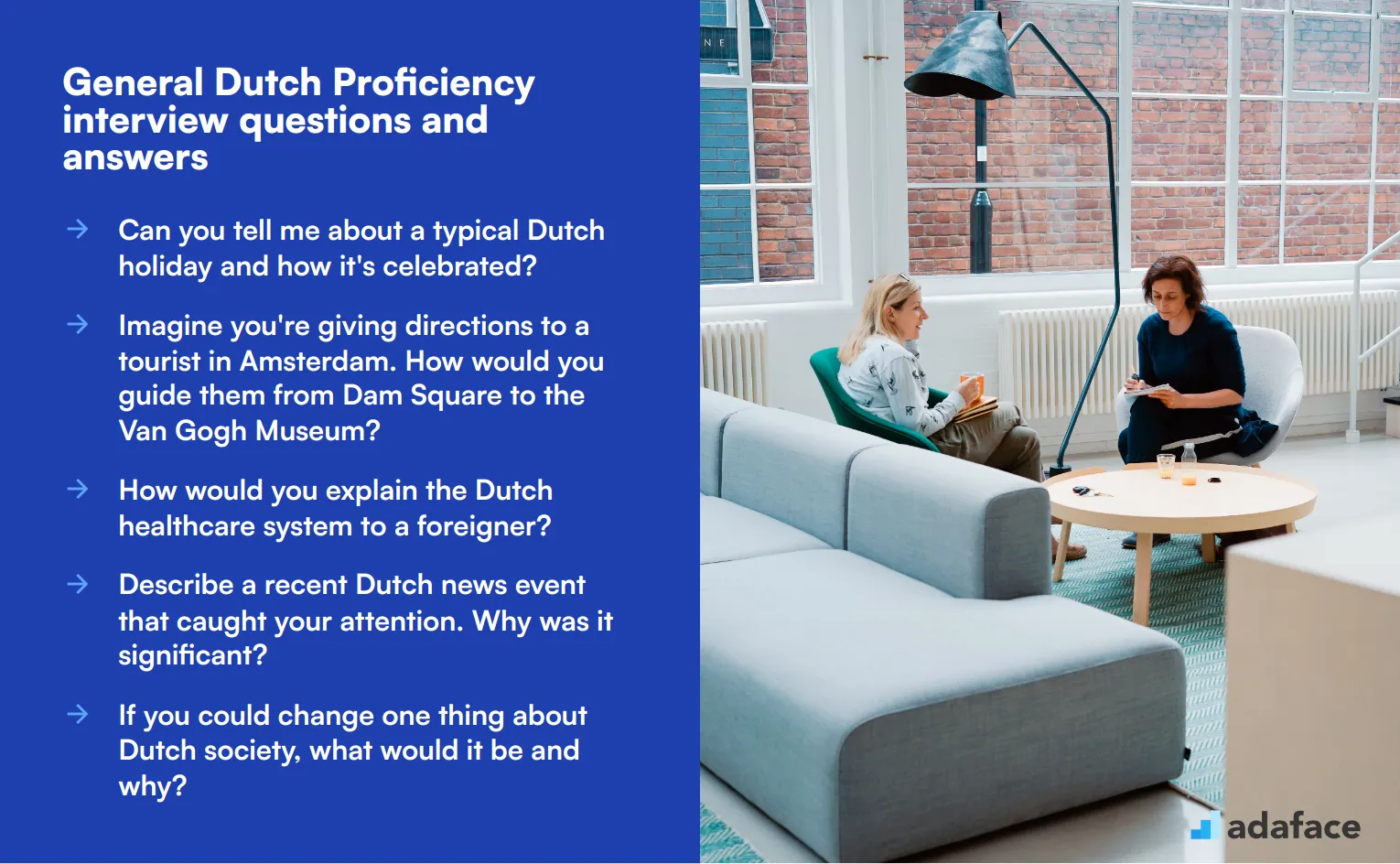
Ready to assess Dutch proficiency in your interviews? These 8 general questions will help you gauge candidates' language skills effectively. Use them to evaluate fluency, comprehension, and cultural understanding. Remember, the goal is to create a relaxed atmosphere where candidates can showcase their Dutch abilities naturally.
1. Can you tell me about a typical Dutch holiday and how it's celebrated?
This question allows candidates to demonstrate their cultural knowledge and vocabulary related to Dutch traditions. A strong answer might discuss Sinterklaas, King's Day (Koningsdag), or Liberation Day (Bevrijdingsdag).
Look for detailed descriptions of activities, foods, and customs associated with the holiday. Pay attention to the candidate's use of specific Dutch terms and their ability to explain cultural nuances in Dutch.
2. Imagine you're giving directions to a tourist in Amsterdam. How would you guide them from Dam Square to the Van Gogh Museum?
This question tests the candidate's ability to give clear instructions and use directional vocabulary in Dutch. A good response should include specific street names, landmarks, and transportation options.
Listen for the use of prepositions, cardinal directions, and spatial vocabulary. The candidate should be able to provide step-by-step directions in a logical order, demonstrating their command of imperative forms and numbers when discussing distances or tram lines.
3. How would you explain the Dutch healthcare system to a foreigner?
This question assesses the candidate's ability to explain complex systems in Dutch. A comprehensive answer should cover key aspects like mandatory health insurance, the role of general practitioners (huisartsen), and how to access specialist care.
Pay attention to the candidate's use of healthcare-specific terminology and their ability to simplify concepts for a non-Dutch audience. Look for clear explanations of unique features of the Dutch system, such as the eigen risico (deductible).
4. Describe a recent Dutch news event that caught your attention. Why was it significant?
This question evaluates the candidate's ability to discuss current events in Dutch and their engagement with Dutch media. A strong answer will provide a clear summary of the event, its context, and its implications.
Listen for the use of appropriate vocabulary related to news and politics. The candidate should be able to express opinions and analyze the event's significance, demonstrating critical thinking skills in Dutch.
5. If you could change one thing about Dutch society, what would it be and why?
This question tests the candidate's ability to express opinions and engage in abstract thinking in Dutch. It also provides insight into their understanding of Dutch society and culture.
Look for well-structured arguments that show a nuanced understanding of Dutch social issues. The candidate should be able to use conditional tenses and subjunctive mood to discuss hypothetical scenarios. Pay attention to their use of transition words and phrases to connect ideas logically.
6. Tell me about a Dutch idiom or expression you find interesting. What does it mean, and when would you use it?
This question assesses the candidate's familiarity with colloquial Dutch and their ability to explain linguistic nuances. A good answer will provide the idiom, its literal translation, its figurative meaning, and an example of its use in context.
Evaluate the candidate's explanation for clarity and cultural insight. They should be able to discuss the origin or cultural significance of the idiom if relevant. Look for the ability to use the idiom naturally in a sentence, demonstrating understanding beyond mere memorization.
7. How would you politely decline an invitation to a colleague's party in Dutch?
This question tests the candidate's grasp of social etiquette and politeness in Dutch. A strong answer should demonstrate the ability to navigate potentially awkward social situations with tact and appropriate language.
Listen for the use of modal verbs, conditional tenses, and polite phrases. The candidate should be able to express regret, provide a reason for declining (without oversharing), and possibly suggest an alternative. Pay attention to tone and register, ensuring the response is neither too formal nor too casual for a workplace context.
8. Describe the process of buying a house in the Netherlands. What are the key steps involved?
This question evaluates the candidate's ability to explain a complex process in Dutch, using specific vocabulary related to real estate and financial transactions. A comprehensive answer should cover steps like finding a makelaar (real estate agent), getting a hypotheek (mortgage), and the role of the notaris (notary).
Look for the use of sequencing words to structure the explanation logically. The candidate should demonstrate knowledge of Dutch-specific practices, such as the voorlopig koopcontract (preliminary purchase agreement) and overdrachtsbelasting (transfer tax). Assess their ability to use passive voice and impersonal constructions common in formal explanations.
21 Dutch Proficiency interview questions to ask junior speakers
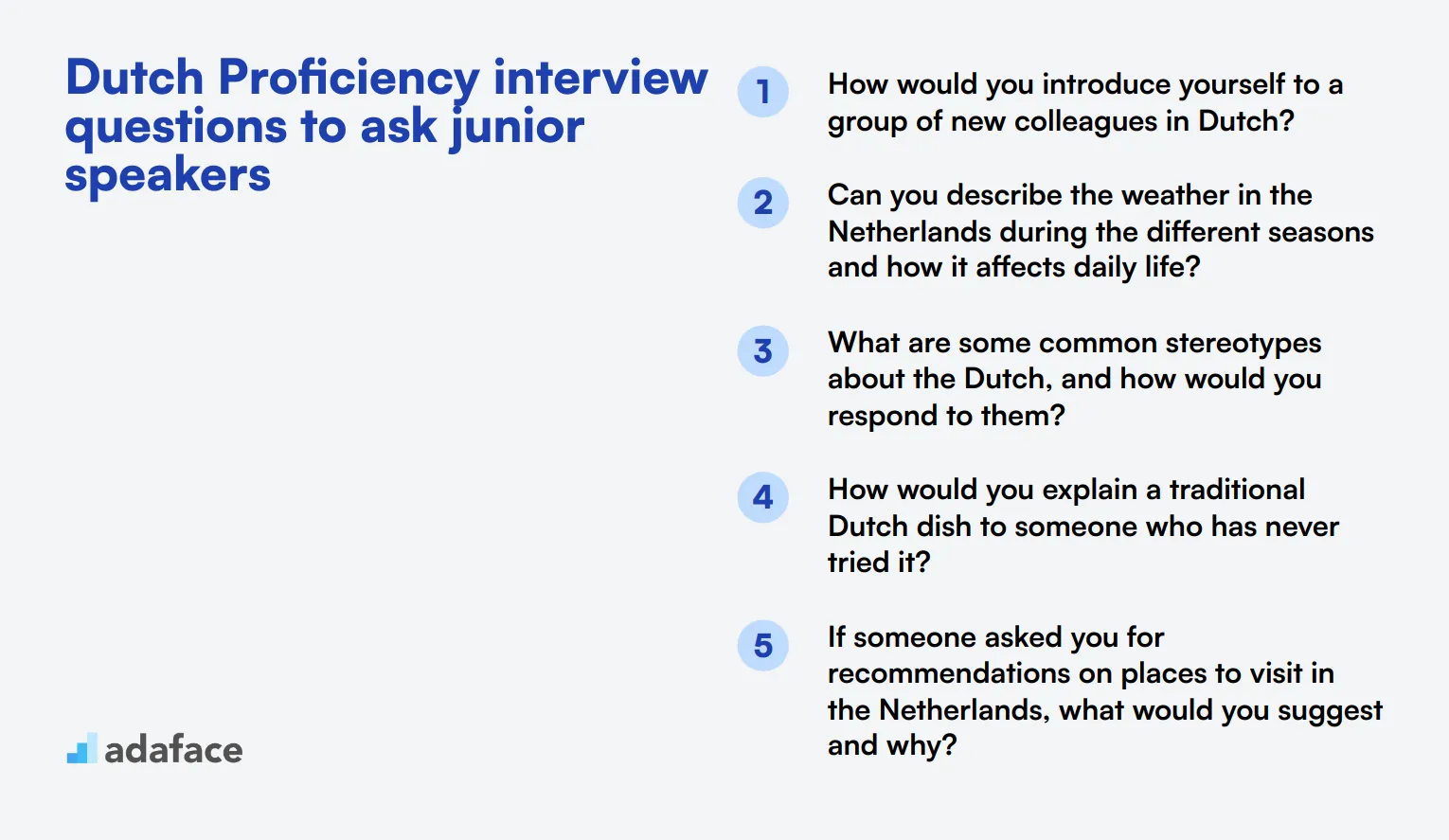
Using this list of Dutch proficiency interview questions can help you gauge a candidate's language skills and cultural understanding effectively. These questions are designed for junior speakers and can be used during interviews to assess their practical communication abilities and comfort with the language, especially in everyday contexts, like in a content writer job description.
- How would you introduce yourself to a group of new colleagues in Dutch?
- Can you describe the weather in the Netherlands during the different seasons and how it affects daily life?
- What are some common stereotypes about the Dutch, and how would you respond to them?
- How would you explain a traditional Dutch dish to someone who has never tried it?
- If someone asked you for recommendations on places to visit in the Netherlands, what would you suggest and why?
- What are some typical Dutch customs or rituals you think are important to share with others?
- How would you handle a misunderstanding with a colleague who speaks Dutch?
- Can you tell me about a popular sport in the Netherlands and its cultural significance?
- How would you explain the concept of 'gezelligheid' to someone unfamiliar with Dutch culture?
- In your opinion, what is the biggest difference between Dutch and your native culture?
- How would you describe your favorite Dutch book or author and what makes them special?
- What is your understanding of the educational system in the Netherlands?
- Can you share a time when you navigated a challenging conversation in Dutch? What did you learn?
- How would you discuss your hobbies or interests in Dutch with someone new?
- What role does cycling play in everyday Dutch life, and how would you explain its importance?
- Can you describe how the Dutch celebrate New Year's Eve and its traditions?
- How would you express concern to a colleague about a work issue in Dutch?
- What are some key phrases you think are essential for living or working in the Netherlands?
- Can you talk about a local festival or event in your area and why it’s significant?
- How would you discuss work-life balance in the context of Dutch culture?
- What steps would you take to learn more about Dutch literature or art?
10 intermediate Dutch Proficiency interview questions and answers to ask mid-tier linguists
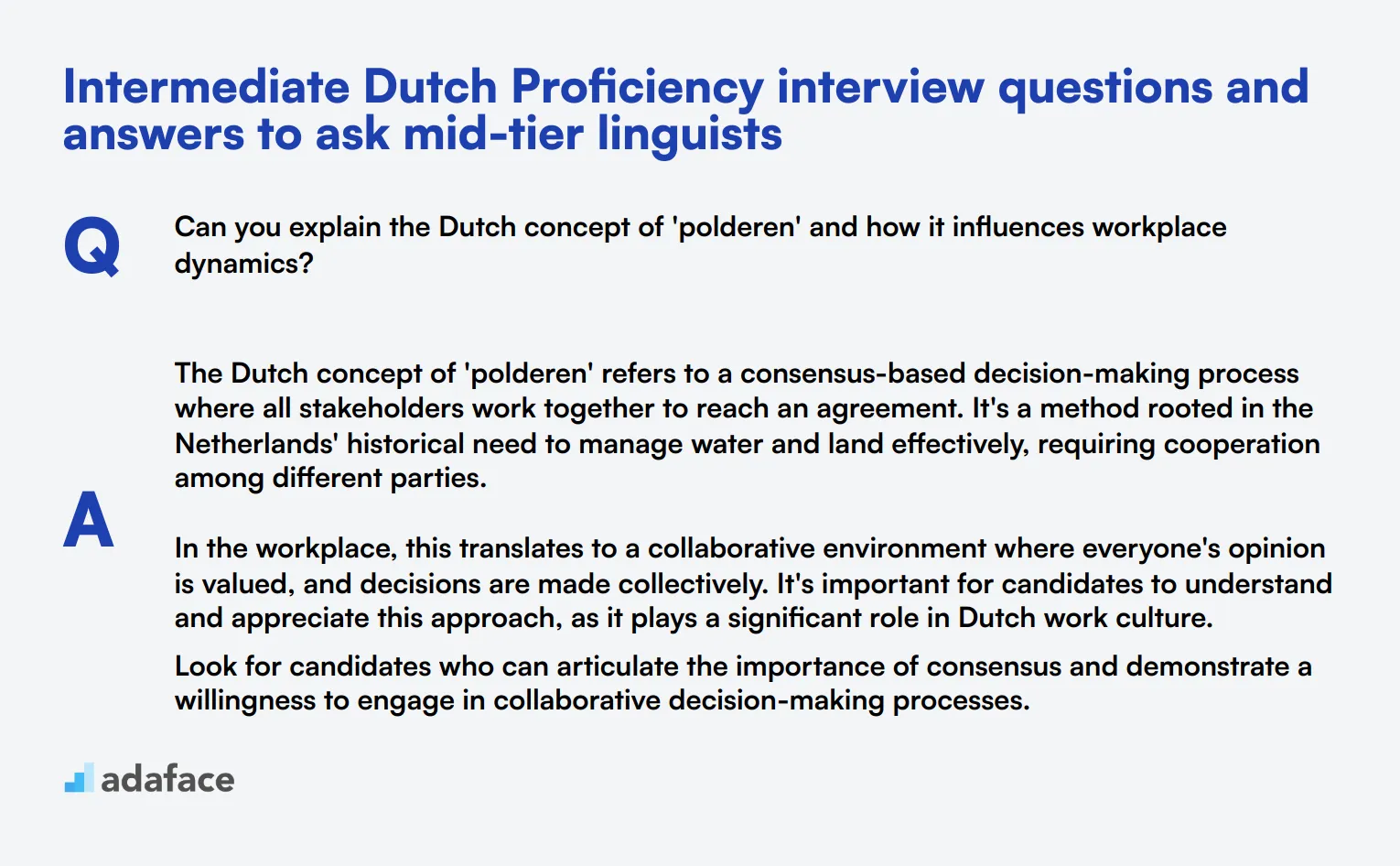
To ensure you select the right mid-tier linguists for your team, having a set of well-crafted intermediate Dutch proficiency interview questions is essential. These questions will help you gauge candidates' language skills and cultural knowledge, providing a solid foundation for your hiring decisions.
1. Can you explain the Dutch concept of 'polderen' and how it influences workplace dynamics?
The Dutch concept of 'polderen' refers to a consensus-based decision-making process where all stakeholders work together to reach an agreement. It's a method rooted in the Netherlands' historical need to manage water and land effectively, requiring cooperation among different parties.
In the workplace, this translates to a collaborative environment where everyone's opinion is valued, and decisions are made collectively. It's important for candidates to understand and appreciate this approach, as it plays a significant role in Dutch work culture.
Look for candidates who can articulate the importance of consensus and demonstrate a willingness to engage in collaborative decision-making processes.
2. How would you describe the Dutch approach to work-life balance?
The Dutch place a high value on work-life balance, often prioritizing personal time and family over long working hours. This approach is supported by flexible working arrangements and a strong emphasis on leisure and wellness.
Candidates should highlight the importance of maintaining a healthy balance between professional responsibilities and personal life. They might mention practices like 'korting op arbeidstijd' (reduced working hours) and the cultural norm of leaving work on time.
An ideal response would demonstrate an understanding of these practices and an appreciation for maintaining a healthy work-life balance, which is essential for long-term productivity and well-being.
3. What are some key elements of Dutch business etiquette that one should be aware of?
Dutch business etiquette emphasizes direct communication, punctuality, and a straightforward approach. It's common for meetings to start and end on time, and for discussions to be open and honest, with little room for ambiguity.
Candidates should mention the importance of addressing colleagues formally, at least initially, and being clear and concise in communications. They might also note the Dutch preference for practical and efficient solutions over elaborate formalities.
Look for candidates who can provide specific examples of how they have navigated Dutch business etiquette in the past, indicating their readiness to fit into a professional Dutch environment.
4. How would you explain the significance of 'Koningsdag' (King's Day) in the Netherlands?
'Koningsdag,' or King's Day, is a national holiday in the Netherlands celebrated on the 27th of April, marking the birthday of King Willem-Alexander. It's known for its nationwide festivities, including street markets, concerts, and parties, with everyone dressed in orange, the national color.
Candidates should be able to describe the vibrant atmosphere and the importance of this day in fostering national pride and community spirit. They might also mention the traditional 'vrijmarkt' (free market) where people sell second-hand goods.
An ideal candidate would highlight the cultural significance of King's Day and its role in bringing people together, showcasing their awareness of important Dutch traditions.
5. Can you describe the Dutch approach to environmental sustainability?
The Netherlands is known for its progressive approach to environmental sustainability, including policies focused on renewable energy, recycling, and reducing carbon emissions. The country has invested heavily in wind and solar power, and many Dutch cities are designed to be bike-friendly to reduce reliance on cars.
Candidates should discuss specific initiatives like the Delta Works, a series of construction projects aimed at protecting the country from sea-level rise, and the widespread use of electric vehicles and public transportation.
Look for candidates who can demonstrate an understanding of these initiatives and express a commitment to sustainable practices, as environmental awareness is a significant aspect of Dutch culture.
6. What are some challenges one might face when learning Dutch, and how would you overcome them?
Learning Dutch can be challenging due to its complex grammar rules, pronunciation, and the prevalence of dialects. The 'g' sound, for example, is particularly difficult for non-native speakers, and the sentence structure can be quite different from English.
Candidates might suggest strategies like immersing oneself in the language through media and conversation, practicing regularly with native speakers, and using language learning apps or taking formal classes.
An ideal response would include specific methods the candidate has used or would use to overcome these challenges, demonstrating their problem-solving skills and dedication to mastering the language.
7. How would you explain the role of 'fietsen' (cycling) in Dutch culture?
Cycling, or 'fietsen,' is an integral part of Dutch culture, with a well-developed infrastructure that includes bike lanes, parking, and traffic signals designed specifically for cyclists. It's not just a mode of transportation but a way of life that promotes health, environmental sustainability, and convenience.
Candidates should highlight the importance of cycling in reducing traffic congestion, lowering carbon emissions, and providing an affordable means of transportation. They might also mention the social aspect of cycling, with many Dutch people using bikes for daily commutes, errands, and leisure activities.
Look for candidates who can articulate the multifaceted role of cycling in Dutch society and express an appreciation for this eco-friendly and community-oriented practice.
8. Can you discuss the significance of the Dutch 'borrel' in professional settings?
A 'borrel' is an informal gathering often held after work where colleagues come together to enjoy drinks and snacks. It's a key aspect of Dutch professional culture, fostering camaraderie and open communication in a relaxed atmosphere.
Candidates should explain that a borrel provides an opportunity for team building, networking, and discussing work-related topics in a more casual setting. It's common for these gatherings to take place on Friday afternoons, known as 'vrijdagmiddagborrel' (Friday afternoon drink).
An ideal candidate would recognize the importance of participating in borrels to build strong professional relationships and integrate into the team, demonstrating their understanding of Dutch workplace dynamics.
9. How would you handle a situation where you disagree with a Dutch colleague's opinion during a meeting?
In Dutch culture, open and direct communication is valued, so it's important to express your disagreement respectfully and constructively. You should present your perspective clearly, backed by facts or logical reasoning, while ensuring you listen to and acknowledge your colleague's viewpoint.
Candidates might mention techniques such as seeking common ground, asking questions to understand the colleague's rationale better, and suggesting a compromise or alternative solution. The goal is to engage in a productive dialogue that moves the discussion forward.
Look for candidates who can demonstrate their ability to handle disagreements with tact and professionalism, showing that they can navigate the direct communication style prevalent in Dutch workplaces.
10. What is the significance of 'gezelligheid' in Dutch culture, and how does it impact social interactions?
'Gezelligheid' is a unique Dutch term that encompasses feelings of coziness, warmth, and conviviality. It's an essential aspect of Dutch social life, often experienced in the company of friends and family, whether at home, in a café, or during social events.
Candidates should describe how gezelligheid is about creating a pleasant and welcoming atmosphere, where people feel comfortable and enjoy each other's company. This concept influences various social interactions, encouraging inclusivity and a sense of community.
An ideal response would highlight the importance of fostering gezelligheid in both personal and professional settings, demonstrating the candidate's understanding of this key cultural value and its impact on building strong social connections.
12 Dutch Proficiency questions related to grammar and syntax
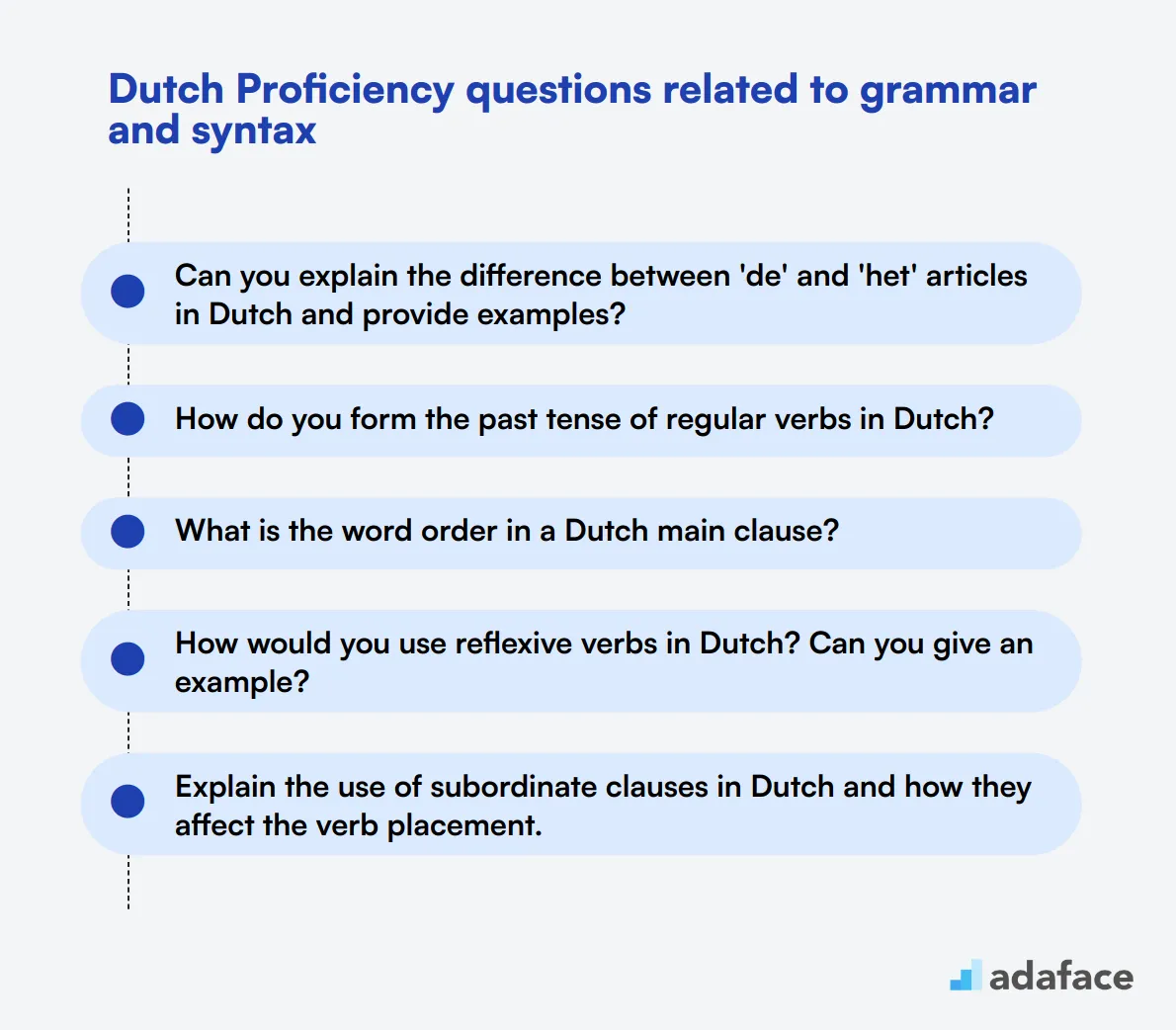
To ensure your candidates have a strong understanding of Dutch grammar and syntax, use this list of Dutch proficiency interview questions. These questions will help you evaluate their language skills in a structured and effective manner, similar to how you'd assess their qualifications for a technical writer job description.
- Can you explain the difference between 'de' and 'het' articles in Dutch and provide examples?
- How do you form the past tense of regular verbs in Dutch?
- What is the word order in a Dutch main clause?
- How would you use reflexive verbs in Dutch? Can you give an example?
- Explain the use of subordinate clauses in Dutch and how they affect the verb placement.
- Can you describe how adjectives inflect in Dutch? Provide an example.
- How do you form plural nouns in Dutch?
- What are some common mistakes non-native speakers make with Dutch word order?
- How do you use modal verbs in Dutch sentences?
- Can you explain the difference between 'er' and 'daar' in Dutch
- Describe the use of definite and indefinite articles in Dutch.
- How would you explain the concept of 'inversion' in Dutch grammar?
9 Dutch Proficiency interview questions and answers related to vocabulary knowledge
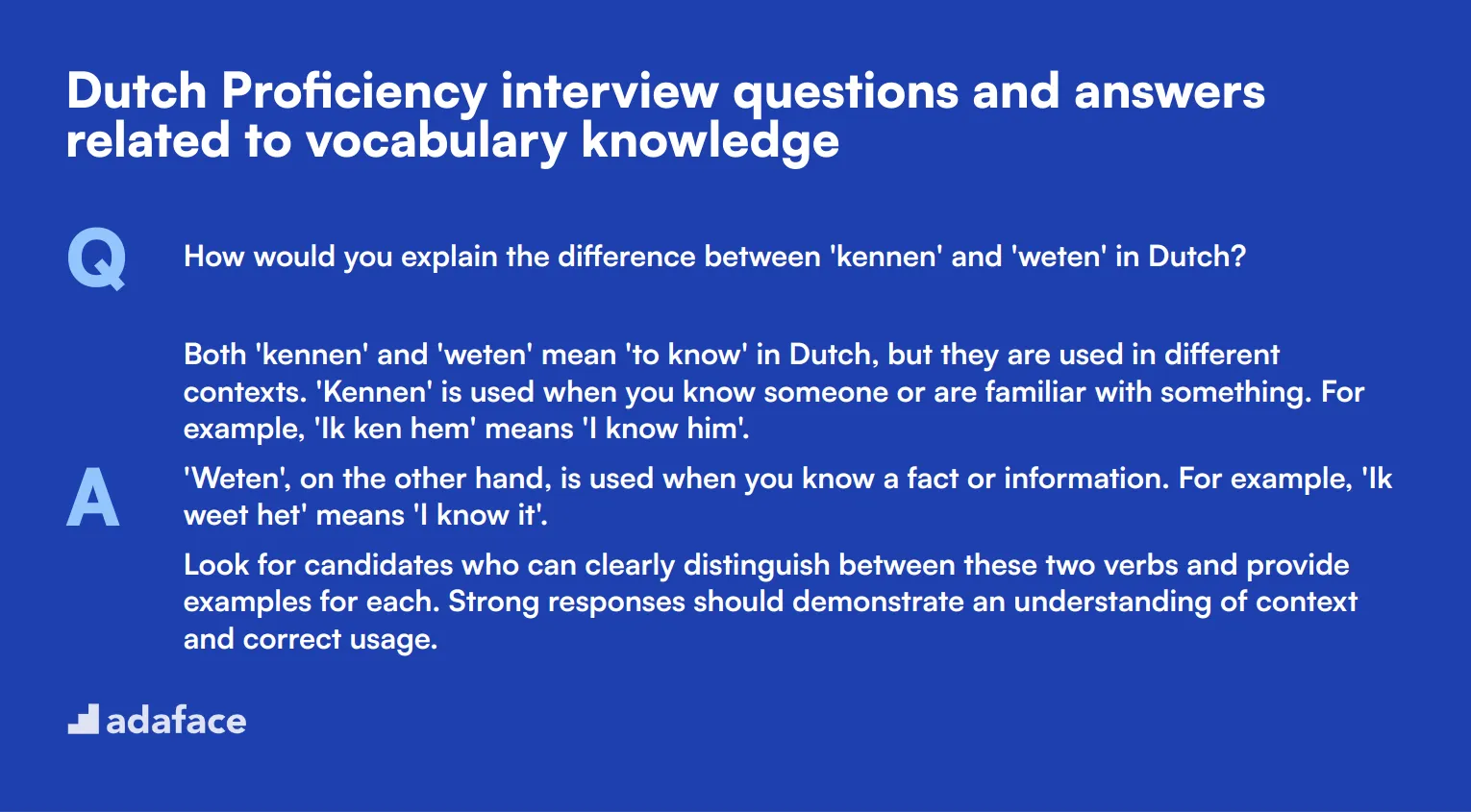
To determine whether your applicants have a strong grasp of Dutch vocabulary and can use it effectively in various contexts, ask them some of these Dutch proficiency interview questions. This list will help you evaluate their language skills and see how comfortable they are with the nuances of Dutch words and phrases.
1. How would you explain the difference between 'kennen' and 'weten' in Dutch?
Both 'kennen' and 'weten' mean 'to know' in Dutch, but they are used in different contexts. 'Kennen' is used when you know someone or are familiar with something. For example, 'Ik ken hem' means 'I know him'.
'Weten', on the other hand, is used when you know a fact or information. For example, 'Ik weet het' means 'I know it'.
Look for candidates who can clearly distinguish between these two verbs and provide examples for each. Strong responses should demonstrate an understanding of context and correct usage.
2. Can you give an example of using 'omdat' and 'want' in a sentence? Explain the difference.
'Omdat' and 'want' both mean 'because' in Dutch, but they are used differently in sentences. 'Omdat' is a subordinating conjunction, meaning it sends the verb to the end of the clause. For example, 'Ik ga vroeg naar bed omdat ik morgen vroeg moet opstaan' (I go to bed early because I have to get up early tomorrow).
'Want' is a coordinating conjunction, keeping the verb in the regular position. For example, 'Ik ga vroeg naar bed want ik moet morgen vroeg opstaan' (I go to bed early because I have to get up early tomorrow).
Candidates should be able to articulate these differences and provide correct sentence examples. Look for clear explanations and correct sentence structures.
3. Describe the difference between 'veel' and 'vaak' in Dutch.
'Veel' means 'a lot' or 'many' and is used to describe quantities. For example, 'Ik heb veel werk' means 'I have a lot of work'.
'Vaak' means 'often' and is used to describe frequency. For example, 'Ik ga vaak naar de gym' means 'I often go to the gym'.
Strong answers should include clear definitions and examples of usage. Candidates should demonstrate their ability to distinguish between quantity and frequency in Dutch.
4. How would you explain the use of 'er' in Dutch sentences?
'Er' is a versatile word in Dutch with several uses. It can be used as an existential pronoun, like in 'Er is een probleem' (There is a problem), or to replace prepositional phrases, like 'Ik ben er geweest' (I have been there).
Additionally, 'er' can be used in impersonal sentences such as 'Er wordt gedanst' (Dancing is happening here).
Look for candidates who can provide multiple examples of 'er' in different contexts. Ideal responses should show a deep understanding of its various roles in Dutch sentences.
5. Can you explain the difference between 'moeten' and 'hoeven'?
'Moeten' means 'must' or 'have to' and is used to express necessity or obligation. For example, 'Ik moet werken' means 'I have to work'.
'Hoeven' means 'need to' but is typically used in negative sentences to express a lack of necessity. For example, 'Ik hoef niet te werken' means 'I don't need to work'.
Candidates should clearly explain these differences and provide accurate examples. Look for an understanding of when to use 'moeten' versus 'hoeven' and the ability to form correct sentences.
6. Describe how to use 'mogen' in a sentence.
'Mogen' means 'may' or 'to be allowed to' in Dutch. It is used to express permission or possibility. For example, 'Mag ik naar buiten?' means 'May I go outside?'.
'Mogen' can also indicate a polite request or suggestion. For example, 'Je mag hier zitten' means 'You may sit here'.
Strong answers should include multiple contexts and correct sentence structures. Look for candidates who can use 'mogen' appropriately and understand its nuances.
7. How would you explain the difference between 'graag' and 'houden van'?
'Graag' means 'with pleasure' or 'gladly' and is often used with verbs to express liking something. For example, 'Ik drink graag koffie' means 'I like to drink coffee'.
'Houden van' means 'to love' or 'to be fond of' and is used for stronger feelings. For example, 'Ik hou van muziek' means 'I love music'.
Candidates should be able to explain these differences clearly and provide appropriate examples. Look for an understanding of the intensity of feelings each word conveys.
8. What is the difference between 'kunnen' and 'weten'?
'Kunnen' means 'can' or 'to be able to' and is used to express ability or possibility. For example, 'Ik kan zwemmen' means 'I can swim'.
'Weten' means 'to know' and is used to express knowledge of a fact. For example, 'Ik weet het antwoord' means 'I know the answer'.
Look for candidates who can distinguish clearly between expressing ability and knowledge. Ideal responses should include accurate examples and context.
9. Can you give an example of using 'zullen' in a future tense sentence?
'Zullen' is used to form the future tense in Dutch and can also indicate a suggestion or offer. For example, 'Ik zal morgen naar het kantoor gaan' means 'I will go to the office tomorrow'.
Additionally, 'Zullen we naar de film gaan?' means 'Shall we go to the movie?' indicating a suggestion.
Strong answers should demonstrate the correct use of 'zullen' for future actions and suggestions. Look for candidates who can form grammatically correct sentences and understand the different contexts in which 'zullen' is used.
7 situational Dutch Proficiency interview questions with answers for hiring top speakers
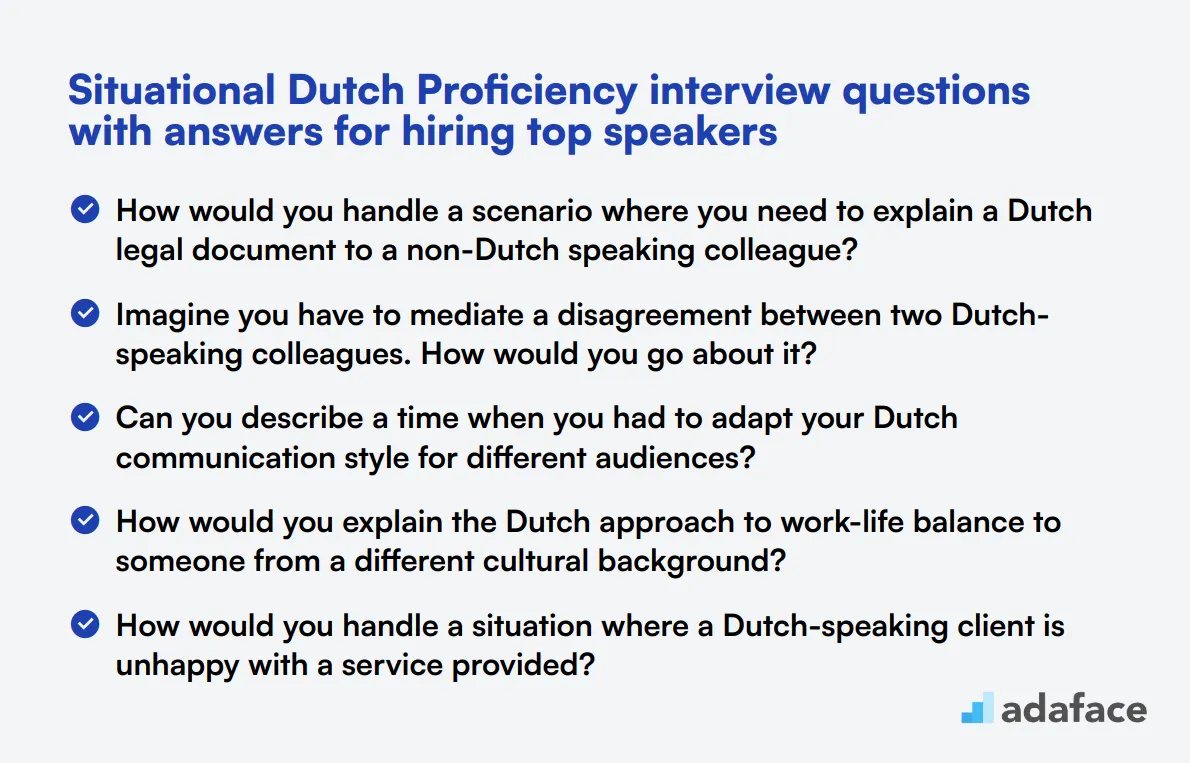
To ensure you identify the best Dutch speakers for your team, consider using these situational Dutch proficiency interview questions. These questions will help you gauge not just their language skills, but also their cultural understanding and practical application in real-life scenarios.
1. How would you handle a scenario where you need to explain a Dutch legal document to a non-Dutch speaking colleague?
When explaining a Dutch legal document to a non-Dutch speaking colleague, I would start by summarizing the main points in simple English. I would highlight the key clauses and terms, making sure my colleague understands the gist of the document.
If any specific legal terminology needs to be understood, I would provide translations and examples to make the terms clearer. Additionally, I would encourage my colleague to ask questions if they need further clarification on any part of the document.
Look for candidates who can simplify complex information and communicate effectively in both Dutch and English. Their ability to bridge language gaps and ensure understanding is essential in a multicultural work environment.
2. Imagine you have to mediate a disagreement between two Dutch-speaking colleagues. How would you go about it?
First, I would listen to each colleague's perspective without interrupting, ensuring they feel heard. I would then summarize their points to confirm my understanding and show that I am neutral.
Next, I would identify common ground and encourage both parties to focus on solutions rather than the problem. I would facilitate a respectful and open dialogue, helping them find a mutually agreeable resolution.
A strong candidate should demonstrate active listening, neutrality, and problem-solving skills. They should be able to manage conflicts effectively while maintaining a positive and professional atmosphere.
3. Can you describe a time when you had to adapt your Dutch communication style for different audiences?
In my previous role, I often had to switch between formal and informal Dutch. For instance, communicating with senior executives required a formal tone, precise language, and respectful address, while interacting with peers or subordinates allowed for a more relaxed and conversational style.
I would consider the audience's expectations, cultural norms, and the context of the communication to adapt my style appropriately. This ensured that my message was well-received and effective across different groups.
Look for candidates who can demonstrate flexibility in their communication and can adapt their language to suit various professional contexts. This skill is crucial for effective collaboration and relationship-building.
4. How would you explain the Dutch approach to work-life balance to someone from a different cultural background?
The Dutch are known for valuing work-life balance, where the boundaries between work and personal life are respected. In the Netherlands, it's common for employees to work flexible hours and prioritize spending time with their families and engaging in leisure activities.
I would emphasize that this approach leads to higher productivity and job satisfaction. I would provide examples of how companies support work-life balance through policies like remote working, part-time employment, and generous vacation allowances.
Candidates should highlight the benefits of the Dutch work-life balance and how it contributes to overall employee well-being. Their explanation should show an understanding of cultural differences and the ability to communicate these effectively.
5. How would you handle a situation where a Dutch-speaking client is unhappy with a service provided?
First, I would listen attentively to the client's concerns, showing empathy and understanding. I would apologize for any inconvenience caused and assure them that their feedback is valued.
Next, I would ask specific questions to understand the root cause of their dissatisfaction and offer possible solutions. I would keep the client informed about the steps being taken to resolve the issue and follow up with them to ensure their satisfaction.
An ideal candidate should demonstrate strong customer service skills, empathy, and problem-solving abilities. They should be able to manage client expectations and turn a negative experience into a positive one.
6. Imagine you are tasked with training new employees on Dutch business etiquette. What key points would you cover?
I would start by explaining the importance of punctuality, as being on time is highly valued in Dutch business culture. Next, I would cover the direct communication style, where honesty and straightforwardness are appreciated.
Other key points would include the preference for consensus-building, the importance of maintaining a good work-life balance, and the casual yet professional dress code. I would also highlight the significance of 'gezelligheid' in fostering a positive work environment.
Candidates should provide a comprehensive overview of Dutch business etiquette, emphasizing cultural nuances that new employees need to be aware of. Their ability to convey these points clearly and engagingly is crucial.
7. How would you describe the process of integrating into a Dutch-speaking team?
Integrating into a Dutch-speaking team involves understanding and respecting the team's communication style and cultural norms. I would start by observing and learning from my colleagues, picking up on their language nuances and social cues.
Building relationships is key, so I would participate in team activities and social events to get to know my colleagues better. Being open, approachable, and willing to learn would help me gain their trust and integrate smoothly.
Look for candidates who demonstrate adaptability, cultural sensitivity, and a proactive approach to building relationships. Their response should indicate their willingness to embrace the team culture and contribute positively.
Which Dutch Proficiency skills should you evaluate during the interview phase?
While it's impossible to assess every aspect of a candidate's Dutch proficiency in a single interview, focusing on core skills can provide valuable insights. The following key areas are particularly important to evaluate during the interview phase.
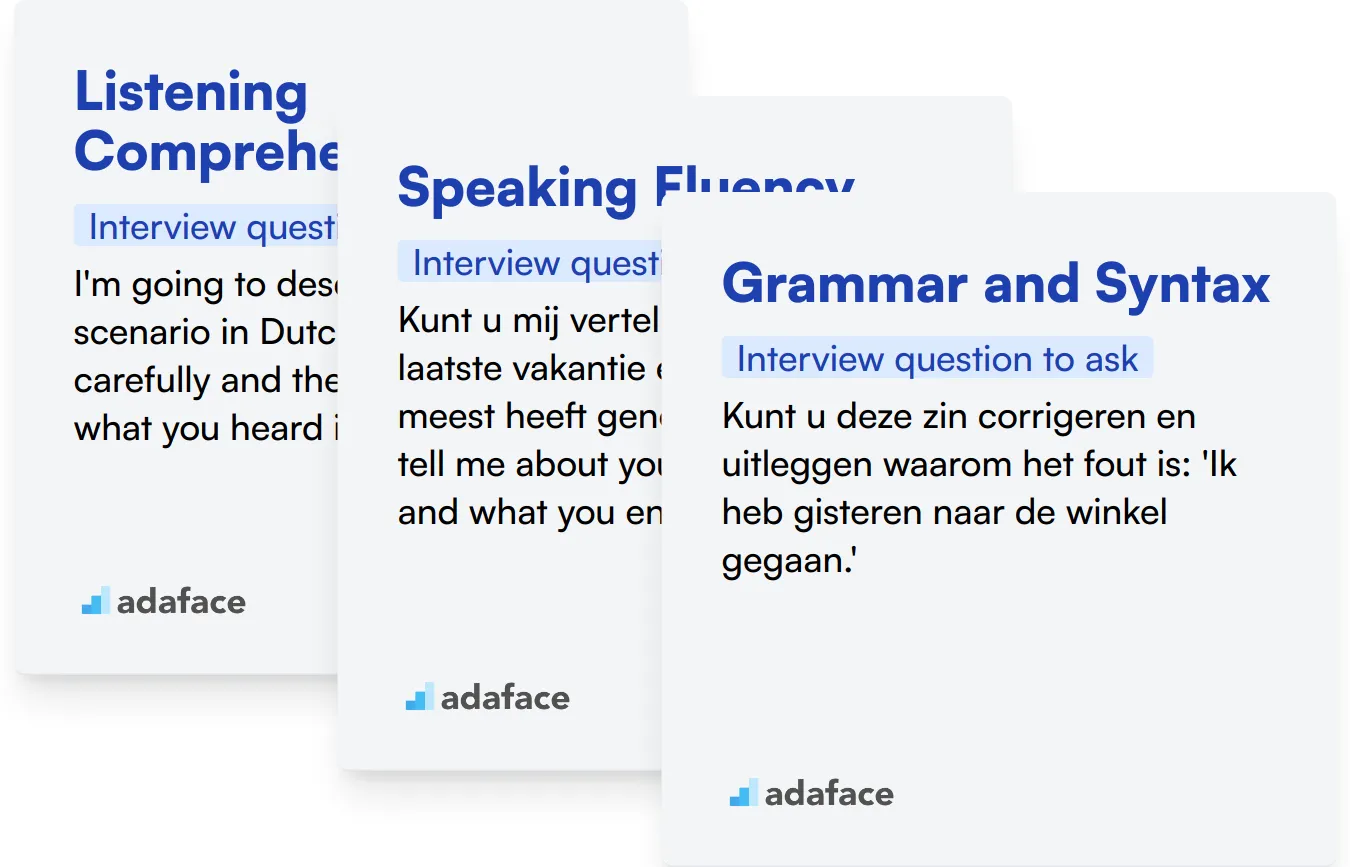
Listening Comprehension
Listening comprehension is a fundamental skill in Dutch proficiency. It indicates how well a candidate can understand spoken Dutch, which is essential for effective communication in various professional settings.
Consider using an assessment test with relevant MCQs to evaluate this skill. Our Dutch proficiency test includes a section dedicated to listening comprehension.
During the interview, you can ask targeted questions to assess listening comprehension. Here's an example:
I'm going to describe a short scenario in Dutch. Please listen carefully and then summarize what you heard in Dutch.
Pay attention to how accurately the candidate captures the main points of the scenario. Note their ability to understand different speech patterns and idiomatic expressions.
Speaking Fluency
Speaking fluency is critical for effective communication in Dutch. It demonstrates a candidate's ability to express ideas clearly and engage in conversations confidently.
To assess speaking fluency, consider asking open-ended questions that require detailed responses. Here's an example:
Kunt u mij vertellen over uw laatste vakantie en wat u het meest heeft genoten? (Can you tell me about your last vacation and what you enjoyed the most?)
Observe the candidate's ability to speak at length, use appropriate vocabulary, and maintain grammatical accuracy. Pay attention to pronunciation, intonation, and overall fluency.
Grammar and Syntax
Proper grammar and syntax are essential for clear and professional communication in Dutch. They reflect a candidate's understanding of the language structure and ability to construct coherent sentences.
To evaluate grammar and syntax skills, you can ask the candidate to correct errors or explain grammatical rules. Here's a sample question:
Kunt u deze zin corrigeren en uitleggen waarom het fout is: 'Ik heb gisteren naar de winkel gegaan.'
Look for the candidate's ability to identify the error (incorrect use of 'heb' with 'gegaan'), correct it ('Ik ben gisteren naar de winkel gegaan'), and explain the rule about using 'zijn' as an auxiliary verb with motion verbs.
Hiring Top Dutch Proficiency Experts with Skills Tests and Interviews
When looking to hire someone with Dutch proficiency skills, it's important to accurately assess their language abilities. This ensures you find candidates who can truly meet your communication needs in Dutch-speaking contexts.
The most effective way to evaluate Dutch language skills is through standardized tests. While Adaface doesn't currently offer a Dutch proficiency test, our English proficiency tests can serve as a model for how language skills are assessed.
After using language tests to shortlist top applicants, you can invite them for interviews. This allows you to further evaluate their Dutch speaking and comprehension skills in person, using the interview questions provided in this post.
Ready to streamline your hiring process for Dutch-speaking roles? Sign up for Adaface to access our suite of skills assessment tools and create a custom testing process for your needs.
Verbal Reasoning Test
Download Dutch Proficiency interview questions template in multiple formats
Dutch Proficiency Interview Questions FAQs
Proficiency in Dutch is crucial for roles that involve communication with Dutch-speaking clients, translations, and local market understanding.
A junior speaker should have basic conversational skills and a fundamental understanding of grammar and vocabulary.
You can assess this by asking specific questions related to sentence structure, verb conjugations, and common grammatical rules in Dutch.
Situational questions can involve role-playing scenarios such as handling a customer complaint in Dutch or translating a complex document accurately.
Yes, skills tests can provide a practical assessment of a candidate's abilities and complement the insights gained from interview questions.
Intermediate speakers should handle more complex conversations and texts, while advanced speakers should exhibit near-native fluency and a deep understanding of idiomatic expressions.

40 min skill tests.
No trick questions.
Accurate shortlisting.
We make it easy for you to find the best candidates in your pipeline with a 40 min skills test.
Try for freeRelated posts
Free resources




